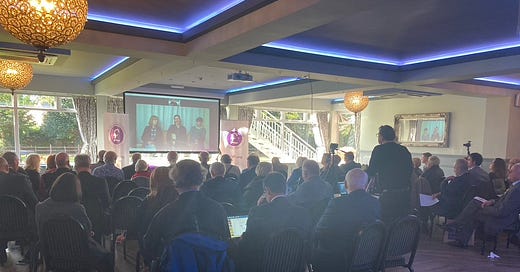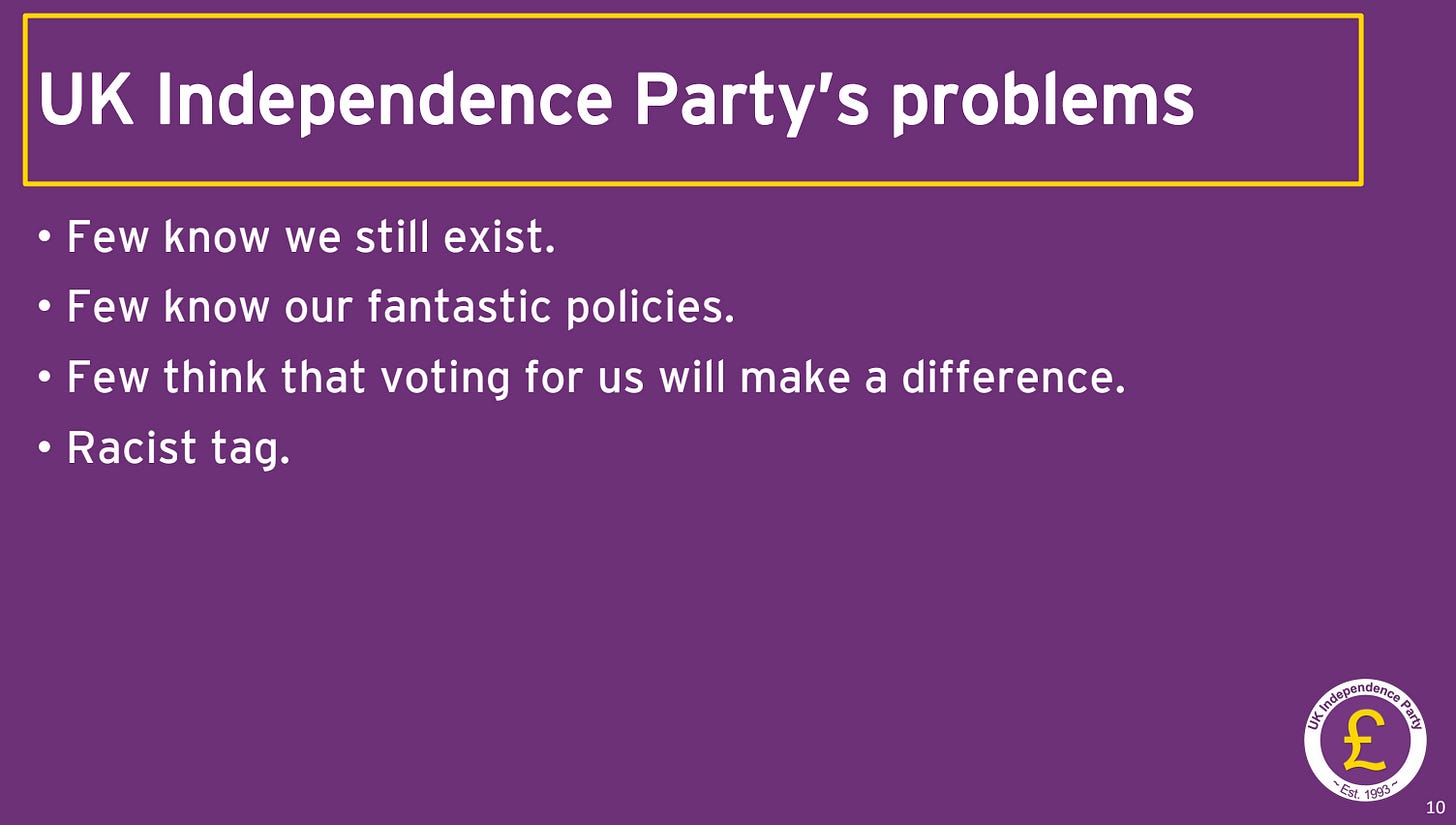Welcome to the UKIP annual conference — turns out the party still exists — where three people in the main hall fall asleep before noon. Those who are awake breathe dyspeptically. The conference organiser interrupts the speaker — who has been soporifically explaining that climate change is a hoax — to announce lunchtime. The elderly members perk up. After the break, the smell of warm, uneaten coleslaw fills the room.
The theme of this year’s event is the war on woke but a more suitable topic would have been coping with loss. In 2016, the party conference was a news event covered by the BBC. Nigel Farage, in his final speech, predicted that the successful Brexit campaign was just a foothill in UKIP’s summit to the top of British politics. “The harvest of votes we could potentially get from the Labour Party hasn’t even started yet,” he said.
Today, fifty members of UKIP fit into the function room of a country pub outside Skegness, and there are plenty of empty chairs. The guest list barely stretches onto a second sheet of A4. There is talk of policies and history and electoral success but the room gives off the impression of a village cricket AGM instead of a party that recently took four million votes in a general election. Without Farage and without Brexit, UKIP is bereft.
“Membership is flatlining,” moans Richard Fullerton, chair of the party’s eastern region. His downbeat candour is rare for party conferences, where organisers would rather prepare their members for a glorious future, one where greatness will be thrust upon them. Not Fullerton.
“We have become invisible,” he says, “with the media ignoring us, and we have lost representation nationally and locally. Loss of Farage and internal fighting have weakened us.”
His presentation cites some crippling issues: “low morale”, “low funding”, “lost branch structure” and “seen as irrelevant”. The diagnosis doesn’t look good: “Few know we still exist.”
Skegness was once one of UKIP’s strongest territories, the flat hills of its homeland. Now, according to Fullerton, local membership has almost halved in the last two years, partly due to disinterest and something that in marketing circles is politely known as “God’s churn”. Nationally, there are somewhere between two and three thousand members, although given the low turnout today even that figure seems optimistic. UKIP has no MPs, just 28 local councillors. In the recent Southend by-election, their candidate Steve Laws, a blogger who films migrant boats landing at Dover, gained 400 votes. That was worse than the candidate for a party called the Psychedelic Movement.
Fullerton has correctly identified that UKIP is on its last legs, however his ideas for treatment will surely hasten its demise. He proposes to abandon the pursuit of power in favour of influencing those who have it. The way to do that, he suggests, is by hammering one issue. This is his killer message: “The Tories don’t want to control immigration.” Hang on, didn’t Suella Braverman, the Home Secretary, just say deporting refugees to Rwanda was her “dream” and “obsession”? Isn’t she pledging to reduce overseas student visas?
This is where our brief dalliance with reality ends. After Fullerton speech, the remainder of the day-long conference is devoted to more familiar topics. We hear of epic battles against woke snowflakery: a GB News presenter discusses the evils of the World Economic Forum, and a Belgian politician speaks about “barbarian” immigrants destroying western civilisation. A Nashville band plays a cappella songs over Zoom about cancel culture. Lembit Öpik takes the floor — any event at which the former Lib Dem MP has star billing is surely a sign of imminent political obliteration. Öpik cracks red-blooded jokes about dating one of the Cheeky Girls, the Romanian twins who sang the 2002 hit Cheeky Song (Touch My Bum).
There are two faces of UKIP. One of them is a Tory exile, a golf-club trencherman in the mould of Farage — the original “Proper Fucking Lunch” enthusiast. The other is a conspiracy theorist, the kind who posts online about the Great Replacement — as their Southend candidate Steve Laws did — and chats amiably about their favourite white nationalist influencers — as one of my seat neighbours does. (Readers may recall Rozanne Duncan, a former UKIP councillor from Kent, telling a 2015 BBC documentary: “The only people I do have a problem with are negroes. And I don’t know why… I really do have a problem with people with negroid features.”)
UKIP rejects any idea that it is a bigoted party, which is somewhat hard to square with its manifesto promise of introducing “secure migrant camps” controlled by the Army. In bold print, the manifesto adds: “It will be our policy that families will be separated.”
Other policies aren’t hateful, just confused: protect the countryside and begin fracking, put development permissions into the hands of locals and build a third runway at Heathrow. The party also wants to restrict the use of hot air balloons and remove speed limits (“let’s get vehicles moving again”).
The age of the audience really speaks to the party’s membership problems. I am one of a handful of people in the room too young to know what a prostate exam entails. Members of the national executive committee introduce themselves and ask with wide eyes if I would consider joining, offering to waive the £30 annual fee. One exec says the London region could do with a jump-start as local membership has fallen and the manager is “a bit doddery”.
I meet a sixth-former from Chester who joined UKIP and debates his classmates about immigration policy, and a young woman who tells me she joined because she’s worried about Islam (later on she will also explain the pandemic was divine retribution for Western materialism).
Farage, for all his YouTube videos alleging small boat refugees might belong to ISIS, was a moderating influence on UKIP. He spoke out against against the leadership campaign of Anne Marie Waters, a former member, who wants to “reduce” the birthrates of Muslim women. She left UKIP to set up a rival party called For Britain — Tommy Robinson joined — although it has since imploded. Today, Waters makes a surprise return to the Skegness conference to speak about grooming gangs and everyone is excited that she might rejoin their party.
Neil Hamilton, the party’s chairman, closes out the day. By this point the audience is fidgety, eager to get to the three-course dinner after the speeches. Hamilton says it’s “bizarre” that, given how badly the Tories are polling, UKIP isn’t more popular. He says even the Lib Dems are doing better than they are. But ultimately he tells the crowd what they want to hear, and despite their dire status, Hamilton predicts that UKIP will one day replace Labour as the opposition party, “the dustbin of people’s discontents”, he grins. Dustbin of history, more like.
More from Scout:
✡️ He was the far-right’s favourite author. Then they found out he’s Jewish.
📚 Britain’s biggest bookseller stocks Holocaust deniers and antisemites
🩸 Return of the antisemitic blood libel: Inside the weird world of Satanic Ritual Abuse activism






Your article, just found, is fair and accurate.
I attended the same conference --- but as a member, in name anyway. My motive was the same as yours !
I think I know which one you were, at the back some of the time, maybe that's when you quietly shot your panoramic of the "dyspepsic"?
Remember the porky yank with a crutch who managed the projector? That was "Lord Wennington", more commonly known as Peter Gammons. An apter name couldn't be found for the notorious 2021 London Mayor candidate. Even he quit a month later.
Remember the mousy guest who spoke? She was appointed Lady Deputy Leader right after, so, while losing a "Lord", the farce gained a "Lady" !
I counted, the number of other members attending was 31. The rest were a mix of guests, lapsed members, and people who like you just strolled ! Ukip is that desperate.
Since Conference, Ukip's fallen to new depths.
I'm on to two ex-member mailing lists and found that true membership is now in double figures. In May it only managed to find fifty candidates, half the active membership, to fill eight and a half thousand vacancies, despite there being no deposits and, post-covid, relaxed nomination signature requirements.
Ukip lost all of these contests.
Now it has no Local Councillors, let alone Assembly Members or MP's, anywhere in the UK.
But in an official blustermail it pretended that parish councillors counted instead.
Weeks before the elections, it threw its doors open to those formerly banned for far-right extremism.
Lying and bluffing is about all Ukip does, to enrich a few, at the expense of the less few.
It exists to grab legacies from the uninformed dead, donations from the delusional, while offering sanctuary to the insane, provided they're well-heeled.
The funniest part is they are so bigoted as not to realise they are bigoted!
Good work, Josh.
Matt